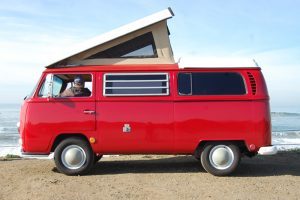Electric conversion easier for some vehicles than others
Published 6:53 pm Tuesday, March 12, 2019
Dear EarthTalk: I saw a news item about overhauling classic old cars with electric engines, and wondering if this can be done with any old car, such as my 1999 Subaru Outback? If this is feasible, maybe I should reconsider my plan of trading up for a new Prius.
Tim St. Germain
Boise, Idaho
It’s true that there’s never been a better time to convert an old gas guzzling car into an emissions-free electric vehicle (EV), but some makes and models are better suited for a so-called “EV swap” than others.

You never know these days whether the engine inside an old VW bus or other classic car is the original gas guzzler or a new “restomod” all-electric one — unless you hear it rumbling at a stop light. Photo by Todd Lappin FlickrCC
Michael Bream of San Marcos, California’s EV West, which made news recently with its conversions of old VWs and Porsches into EVs, says you could convert a ‘99 Subaru — but EV Swaps are typically reserved for classic cars. “A newer Subaru has a ULEV certified (low emission) engine, so it’s not as bad a polluter as a classic car, and doesn’t suffer from reliability and power issues that classic cars typically suffer from,” he says. “A typical conversion of a Subaru would cost about the same with parts and labor as a brand-new all-wheel drive Tesla Model 3, so unless your vehicle is extremely well loved, or you can’t stand the thought of selling it, then it might be a better solution to buy or lease a new EV.”
EV West is one of a handful of garages across North America now specializing in EV conversions. Some others include: Zelectric Motors (San Diego, CA), ElectricGT (Chatsworth, CA), Make Mine Electric (Sebastopol, CA), Electric Vehicles of Washington (Bellingham, WA), Shockwave Motors (Russellville, TN), Epic Car Conversions (Toronto, ON) and Green Shed Conversions (Crystal River, FL).
If you don’t want to wait to get your car converted by one of these shops, you’ll just have to do it yourself (or find a local mechanic looking for an interesting project). Luckily lots of companies now sell EV conversion kits (Canadian Electric Vehicles, Electro Automotive, Wilderness Electric Vehicles, DIY EV, EV Source, Metric Mind Corporation, EV Drive) that include new engines, batteries and components. Expect to spend about $8,000 on all the parts needed for the job (and tack on an additional ~50 percent more if you opt for longer-range lithium ion batteries). The labor will be up to you. DIYers should check out EVRater.com’s “How to Build Your own Electric Vehicle in 5 Easy Steps” or Mechanic Doctor’s “How to Convert Your Car to an Electric Vehicle” for step-by-step instructions. Meanwhile, California-based EV4U runs “three-day hands-on conversion workshops” near Sacramento for $495.
With a new base model Prius starting at $23,000, you may well be better off doing the EV Swap on your old car. According to EVW, the operating costs of driving a Prius hybrid ($0.14/mile) are about four times what it costs to get around in an EV (whether native or a conversion). “In addition to the fuel savings, electric cars do not need oil changes, spark plugs, distributors, timing belts, etc.,” EVW adds.
What you won’t get is that new car smell or the nervous feeling of driving a brand-new car off the dealer’s lot. But you will get the satisfaction of knowing that you saved two tons of metal from the junk heap — and saved the world the trouble of sourcing materials for and building another brand-new Prius.
EarthTalk is produced by Roddy Scheer & Doug Moss. To donate, visit www.earthtalk.org. Send questions to question@earthtalk.org.





